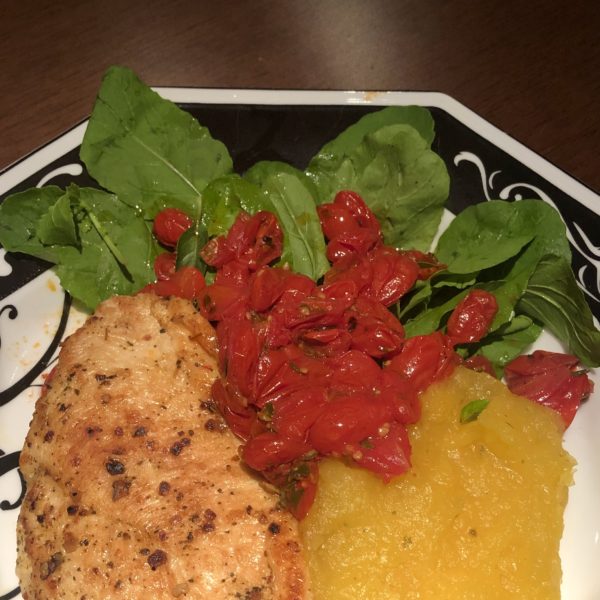
Sabe aquelas semanas que são corridas, e que não temos muito tempo para cozinhar algo muito elaborado e saudável? Principalmente nesse tempo de pandemia, em que os dias parecem se tornar mais curtos, nos deparamos com essa falta de tempo. Hoje, a Gabrielle Licheski compartilhou uma receita perfeita para essas semanas! A receita é de tomate confit, que basicamente são tomates cerejas assados no forno com azeite de oliva e alguns temperos… Veja o que ela nos contou sobre a receita:
” Essa é uma receita que sempre fazemos aqui em casa, e quem me ensinou foi a minha mãe. O dia a dia sempre é muito corrido por aqui, principalmente algumas semanas… Então como gostamos de manter uma alimentação saudável durante a semana, nos finais de semana preparamos tomate confit. Assim, como ele pode ser conservado por um bom tempo na geladeira, durante a semana nós retiramos uma quantia da geladeira e esquentamos para servir de acompanhamento com diferentes comidas! Acaba se tornando muito prático e dando um toque final em cada refeição. Sem falar no cheirinho gostoso de manjericão, tomilho e alecrim que se espalha na casa inteira!” – Gabrielle Licheski
O tomate é o alimento que contém a maior concentração de um antioxidante chamado licopeno. Esse é um poderoso tipo de carotenoide, também responsável por conferir a cor vermelha a outros vegetais, como morango e melancia. Por isso, quanto mais vermelho for o tomate, maior será a concentração desse nutriente. A vantagem? Por ser um antioxidante, ele protege nosso organismo do ataque dos radicais livres e, com isso, evita doenças como o câncer.
O licopeno é mais realçado e absorvido pelo organismo quando submetido a altas temperaturas, e também, quando combinado com gorduras saudáveis, como o azeite de oliva extravirgem (uma das melhores gorduras monoinsaturadas).
Portanto, a preparação do tomate confit deixa o licopeno presente nos tomates muito mais biodisponível, pois se utiliza azeite de oliva e é colocado para assar em alta temperatura.
Receita
Ingredientes:
Modo de preparo:
Observação: Da para conservar por até 10 dias na geladeira, e fica bom até mesmo comer com torradinhas!
Link para acessar o vídeo da receita: https://www.facebook.com/watch/?v=268224827775561
Do you know those weeks that are busy, and that we don’t have much time to cook something very elaborate and healthy? Especially in this time of pandemic, when the days seem to become shorter, we face this lack of time. Today, Gabrielle Licheski shared a perfect recipe for these weeks! The recipe is for tomato confit, which is basically cherry tomatoes baked in the oven with olive oil and some spices … See what she told us about the recipe:
“This is a recipe that we always make here at home, and my mother that taught me. Daily life is always very busy here, especially in some weeks … We like to maintain a healthy diet during the week, for that reason on weekends we prepare tomato confit. It can be kept for a long time in the refrigerator, so during the week we take a small amount out of the fridge and heat it up to serve with different foods! It ends up being very practical and adding a touch at the end of every meal. Not to mention the delicious smell of basil, thyme and rosemary that spreads throughout the house! ” – Gabrielle Licheski
Tomato is the food that contains the highest concentration of an antioxidant called lycopene. This is a powerful type of carotenoid, also responsible for giving red color to other vegetables, such as strawberries and watermelons. Therefore, the redder the tomato, the greater the concentration of this nutrient. The advantage? Because it is an antioxidant, it protects our body from attack by free radicals and thus prevents diseases such as cancer.
Lycopene is most enhanced and absorbed by the body when subjected to high temperatures, and also, when combined with healthy fats, such as extra virgin olive oil (one of the best monounsaturated fats).
Therefore, the preparation of tomato confit makes the lycopene present in tomatoes much more bioavailable, as olive oil is used and as the tomatoes are placed at high temperature for roasting.
Recipe
Ingredients:
Directions:
Note: You can keep it in the refrigerator for up to 10 days, and it is good even to eat it with toast!
Link to access the recipe video: https://www.facebook.com/watch/?v=268224827775561
Referências Bibliográficas:
MORITZ, Bettina; TRAMONTE, Vera Lúcia Cardoso. Biodisponibilidade do licopeno. Rev. Nutr., Campinas , v. 19, n. 2, p. 265-273, Abr. 2006 . Disponível em <http://www.scielo.br/scielo.php?script=sci_arttext&pid=S1415-52732006000200013&lng=en&nrm=iso>. Acessado em 13 Julho 2020.